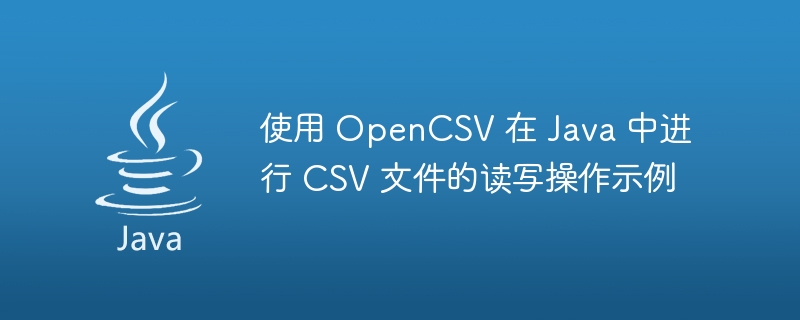

Example of using OpenCSV to read and write CSV files in Java
Introduction:
CSV (Comma-Separated Values) is a common text file Format, usually used to store tabular data. In Java, OpenCSV is a popular open source library that can be used to handle reading and writing of CSV files. This article will introduce how to use OpenCSV to read and write CSV files, including reading and parsing CSV files, and creating and writing CSV files.
1. Reading and parsing CSV files
First, we need to add dependencies on the OpenCSV library. You can add the OpenCSV dependency by adding the following code to the pom.xml file of the Maven project:
<dependency>
<groupId>com.opencsv</groupId>
<artifactId>opencsv</artifactId>
<version>5.3</version>
</dependency>Next, we can read and parse the CSV file through the following steps:
Create a CSVReader object and pass the path to the CSV file to the constructor.
CSVReader reader = new CSVReader(new FileReader("path/to/csvfile.csv"));Call the readNext() method of the CSVReader object to read the next line of data from the CSV file and store it in a string array.
String[] nextLine;
while ((nextLine = reader.readNext()) != null) {
// 处理CSV文件的每一行数据
}For each row of data, the value of each field can be accessed using the index of the string array.
String field1 = nextLine[0]; // 第一个字段的值 String field2 = nextLine[1]; // 第二个字段的值 // ...
Using the above code, we can easily read and parse the data in the CSV file.
2. Creation and writing of CSV files
Different from reading CSV files, we need to use the CSVWriter class to create and write CSV files. The following is sample code to create and write a CSV file:
Create a CSVWriter object and pass the path to the CSV file and the write mode (e.g. true means append mode, false indicates overriding mode) is passed to the constructor.
CSVWriter writer = new CSVWriter(new FileWriter("path/to/csvfile.csv", true));Use the writeNext() method of the CSVWriter object to write data to the CSV file. This method accepts as argument a string array containing the value of each field to be written.
String[] data1 = {"John", "Doe", "johndoe@example.com"};
String[] data2 = {"Jane", "Smith", "janesmith@example.com"};
// ...
writer.writeNext(data1);
writer.writeNext(data2);
// ...After writing is completed, you need to call the close() method of the CSVWriter object to close the stream and save the file.
writer.close();
Using the above code, we can create a new CSV file and write the data into it.
Conclusion:
Through the OpenCSV library, we can easily read and write CSV files, including reading and parsing CSV files, and creating and writing CSV files. By using the API provided by the OpenCSV library, we can easily process CSV files, making our operation of CSV files in Java more convenient and efficient.
Note: When using the OpenCSV library, be sure to familiarize yourself with OpenCSV's documentation and API reference. Different OpenCSV versions may have slight differences, so make sure to use the appropriate version for your project and use the OpenCSV library correctly according to the official documentation.
The above is the detailed content of Example of using OpenCSV to read and write CSV files in Java. For more information, please follow other related articles on the PHP Chinese website!
